- Home
- Karen Hesse
Out of the Dust Page 2
Out of the Dust Read online
Page 2
wind
blew plate-glass windows in,
tore electric signs down,
ripped wheat
straight out of the ground.
February 1934
Rules of Dining
Ma has rules for setting the table.
I place plates upside down,
glasses bottom side up,
napkins folded over forks, knives, and spoons.
When dinner is ready,
we sit down together
and Ma says,
“Now.”
We shake out our napkins,
spread them on our laps,
and flip over our glasses and plates,
exposing neat circles,
round comments
on what life would be without dust.
Daddy says,
“The potatoes are peppered plenty tonight, Polly,”
and
“Chocolate milk for dinner, aren’t we in clover!”
when really all our pepper and chocolate,
it’s nothing but dust.
I heard word from Livie Killian.
The Killians can’t find work,
can’t get food.
Livie’s brother, Reuben, fifteen last summer,
took off, thinking to make it on his own.
I hope he’s okay.
With a baby growing inside Ma,
it scares me thinking, Where would we be without
somewhere to live?
Without some work to do?
Without something to eat?
At least we’ve got milk. Even if we have to chew it.
February 1934
Breaking Drought
After seventy days
of wind and sun,
of wind and clouds,
of wind and sand,
after seventy days,
of wind and dust,
a little
rain
came.
February 1934
Dazzled
In the kitchen she is my ma,
in the barn and the fields she is my daddy’s wife,
but in the parlor Ma is something different.
She isn’t much to look at,
so long and skinny,
her teeth poor,
her dark hair always needing a wash, but
from the time I was four,
I remember being dazzled by her
whenever she played the piano.
Daddy bought it, an old Cramer,
his wedding gift to her.
She came to this house and found gaps in the walls,
a rusty bed, no running water,
and that piano,
gleaming in the corner.
Daddy gets soft eyes, standing behind her while she
plays.
I want someone to look that way at me.
On my fifth birthday,
Ma sat me down beside her
and started me to reading music,
started me to playing.
I’m not half so good as Ma.
She can pull Daddy into the parlor
even after the last milking, when he’s so beat
he barely knows his own name
and all he wants
is a mattress under his bones.
You’ve got to be something
to get his notice that time of day,
but Ma can.
I’m not half so good with my crazy playing
as she is with her fine tunes and her
fancy fingerwork.
But I’m good enough for Arley, I guess.
March 1934
Debts
Daddy is thinking
of taking a loan from Mr. Roosevelt and his men,
to get some new wheat planted
where the winter crop has spindled out and died.
Mr. Roosevelt promises
Daddy won’t have to pay a dime
till the crop comes in.
Daddy says,
“I can turn the fields over,
start again.
It’s sure to rain soon.
Wheat’s sure to grow.”
Ma says, “What if it doesn’t?”
Daddy takes off his hat,
roughs up his hair,
puts the hat back on.
“Course it’ll rain,” he says.
Ma says, “Bay,
it hasn’t rained enough to grow wheat in
three years.”
Daddy looks like a fight brewing.
He takes that red face of his out to the barn,
to keep from feuding with my pregnant ma.
I ask Ma
how,
after all this time,
Daddy still believes in rain.
“Well, it rains enough,” Ma says,
“now and again,
to keep a person hoping.
But even if it didn’t
your daddy would have to believe.
It’s coming on spring,
and he’s a farmer.”
March 1934
Foul as Maggoty Stew
Arley Wanderdale said
the rehearsals for Sunny of Sunnyside
shouldn’t take me out of school
more than twice next week.
When I told Ma she got angry about
my missing school to play piano for some show.
Me and Daddy,
we’re trying our best to please Ma,
for fear of what it might do to the baby if we don’t.
I don’t know why she’s
so against my playing.
She says that school is important,
but I do all right in school.
I know she doesn’t like the kind
of music I play,
but sometimes I think she’s
just plain jealous
when I’m at the piano
and she’s not.
And maybe she’s a little afraid
of me going somewhere with the music
she can’t follow.
Or of the music taking me
so far away one day
I’ll never come home.
Whatever the reason, she said I couldn’t do it.
Arley had to get somebody to take my place.
I do as she says. I go to school,
and in the afternoons I come home,
run through my chores,
do my reading and my math work at the
kitchen table
and all the while I glare at Ma’s back with a scowl
foul as maggoty stew.
March 1934
State Tests
When I got home I told Ma
our school scored higher than the
whole state on achievement tests and
I scored top of eighth grade.
Ma nodded.
“I knew you could.”
That’s all she said.
She was proud,
I could tell.
But she didn’t
coo like Mad Dog’s ma. Or
go on
like Mrs. Killian used to do.
Daddy says,
“That’s not your ma’s way.”
But I wish it was.
I wish she’d give me a little more to hold on to than
“I knew you could.”
Instead she makes me feel like she’s just
taking me in like I was
so much flannel dry on the line.
March 1934
Fields of Flashing Light
I heard the wind rise,
and stumbled from my bed,
down the stairs,
out the front door,
into the yard.
The night sky kept flashing,
lightning danced down on its spindly legs.
I sensed it before I knew it was coming.
I heard it,
smelled it,
tasted it.
Dust.
While Ma and Daddy slept,
the dust came,
tearing up fields where the winter wheat,
set for harvest in June,
stood helpless.
I watched the plants,
surviving after so much drought and so much wind,
I watched them fry,
or
flatten,
or blow away,
like bits of cast-off rags.
It wasn’t until the dust turned toward the house,
like a fired locomotive,
and I fled,
barefoot and breathless, back inside,
it wasn’t until the dust
hissed against the windows,
until it ratcheted the roof,
that Daddy woke.
He ran into the storm,
his overalls half-hooked over his union suit.
“Daddy!” I called. “You can’t stop dust.”
Ma told me to
cover the beds,
push the scatter rugs against the doors,
dampen the rags around the windows.
Wiping dust out of everything,
she made coffee and biscuits,
waiting for Daddy to come in.
Sometime after four,
rubbing low on her back,
Ma sank down into a chair at the kitchen table
and covered her face.
Daddy didn’t come back for hours,
not
until the temperature dropped so low,
it brought snow.
Ma and I sighed, grateful,
staring out at the dirty flakes,
but our relief didn’t last.
The wind snatched that snow right off the fields,
leaving behind a sea of dust,
waves and
waves and
waves of
dust,
rippling across our yard.
Daddy came in,
he sat across from Ma and blew his nose.
Mud streamed out.
He coughed and spit out
mud.
If he had cried,
his tears would have been mud too,
but he didn’t cry.
And neither did Ma.
March 1934
Tested by Dust
While we sat
taking our six-weeks test,
the wind rose
and the sand blew
right through the cracks in the schoolhouse wall,
right through the gaps around the window glass,
and by the time the tests were done,
each and every one of us
was coughing pretty good and we all
needed a bath.
I hope we get bonus points
for testing in a dust storm.
April 1934
Banks
Ma says,
everything we lost
when the banks closed
’cause they didn’t have enough cash to go around,
all the money that’s ours
is coming back to us in full.
Good.
Now we have money for a doctor
when the baby comes.
April 1934
Beat Wheat
County Agent Dewey
had some pretty bad news.
One quarter of the wheat is lost:
blown away or withered up.
What remains is little more than
a wisp of what it should be.
And every day we have no rain,
more wheat dies.
County Agent Dewey says, “Soon
there won’t be enough wheat
for seed to plant next fall.”
The piano is some comfort in all this.
I go to it and I forget the dust for hours,
testing my long fingers on wild rhythms,
but Ma slams around in the kitchen when I play
and after a while she sends me to the store.
Joe De La Flor doesn’t see me pass him by;
he rides his fences, dazed by dust.
I wince at the sight of his rib-thin cattle.
But he’s not even seeing them.
I look at Joe and know our future is drying up
and blowing away with the dust.
April 1934
Give Up on Wheat
Ma says,
“Try putting in a pond, Bayard.
We can fill it off the windmill.
We’ve got a good well.”
Daddy grumbles, “The water’ll seep
back into the ground
as fast as I can pump it, Pol.
We’ll dry up our well
and then we’ll have nothing.”
“Plant some other things, then,” Ma says.
“Try cotton,
sorghum. If we plant the fields in different crops,
maybe some will do better,
better than wheat.”
Daddy says,
“No.
It has to be wheat.
I’ve grown it before.
I’ll grow it again.”
But Ma says, “Can’t you see
what’s happening, Bayard?
The wheat’s not meant to be here.”
And Daddy says,
“What about those apple trees of yours, Pol?
You think they are?
Nothing needs more to drink than those two.
But you wouldn’t hear of leveling your apples,
would you?”
Ma is bittering. I can see it in her mouth.
“A pond would work,” she says,
sounding crusty and stubborn.
And Daddy says, “Look it, Pol, who’s the farmer?
You or me?”
Ma says,
“Who pays the bills?”
“No one right now,” Daddy says.
Ma starts to quaking but she won’t let Daddy see.
Instead, she goes out to the chickens
and
her anger,
simmering over like a pot in an empty kitchen,
boils itself down doing chores.
April 1934
What I Don’t Know
My teacher, Miss Freeland,
is singing
at the Shrine
along with famous
opera stars
from all around the country
in a play called
Madame Butterfly.
I’ve never heard of that play.
“Most everyone’s heard of Madame Butterfly,”
Mad Dog says.
How does that
singing plowboy know something I don’t?
And how much more is out there
most everyone else has heard of
except me?
April 1934
Apple Blossoms
Ma
has been nursing these two trees
for as long as I can remember.
In spite of the dust,
in spite of the drought,
because of Ma’s stubborn care,
these trees are
thick with blossoms,
delicate and
pinky-white.
My eyes can’t get enough of the sight of them.
I stand under the trees
and let the petals
fall into my hair,
a blizzard
of sweet-smelling flowers,
dropped from the boughs of the two
placed there
in the front yard by Ma
before I was born,
that she and they might bring forth fruit
into our home,
together.
May 1934
World War
Daddy was just seventeen
when he fought in the
Great War off in France.
There’s not much he’s willing to
say about those days, except about the popp
ies.
He remembers the poppies,
red on the graves of the dead.
Daddy says
that war tore France up
worse than a tornado,
worse than a dust storm,
but no matter,
the wild poppies bloomed in the trail of the fighting,
brightening the French countryside.
I wish I could see poppies
growing out of this dust.
May 1934
Apples
Ma’s apple blossoms
have turned to hard green balls.
To eat them now,
so tart,
would turn my mouth inside out,
would make my stomach groan.
But in just a couple months,
after the baby is born,
those apples will be ready
and we’ll make pies
and sauce
and pudding
and dumplings
and cake
and cobbler
and have just plain apples to take to school
and slice with my pocket knife
and eat one juicy piece at a time
until my mouth is clean
and fresh
and my breath is nothing but apple.
June 1934
Dust and Rain
On Sunday,
winds came,
bringing a red dust
like prairie fire,
hot and peppery,
searing the inside of my nose,
the whites of my eyes.
Roaring dust,
turning the day from sunlight to midnight.
And as the dust left,
rain came.
Rain that was no blessing.
It came too hard,
too fast,
and washed the soil away,
washed the wheat away with it.
Now
little remains of Daddy’s hard work.
And the only choice he has
is to give up or
start all over again.
At the Strong ranch
they didn’t get a single drop.
So who fared better?
Ma looks out the window at her apple trees.
Hard green balls have dropped to the ground.
But there are enough left;
enough
for a small harvest,
if we lose no more.
June 1934
Harvest
The combines have started moving across the fields,
bringing in wheat,
whatever has managed to grow.
Mr. Tuttle delivered the first load to town
selling it for seventy-three cents a bushel.
Not bad.
Mr. Chaffin, Mr. Haverstick, and Mr. French,

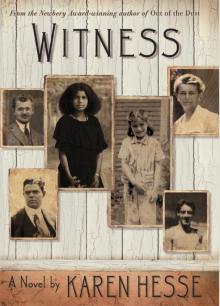 Witness
Witness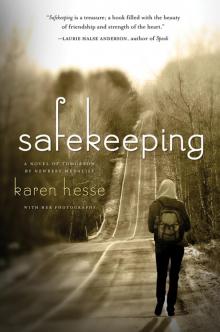 Safekeeping
Safekeeping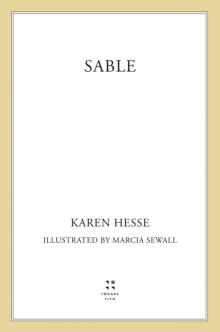 Sable
Sable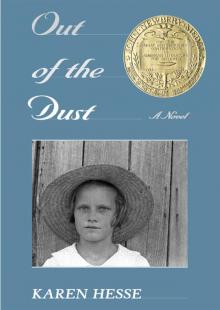 Out of the Dust
Out of the Dust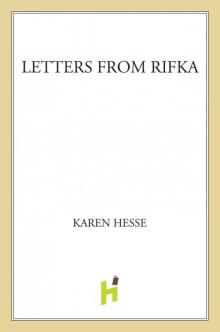 Letters From Rifka
Letters From Rifka The Music of Dolphins
The Music of Dolphins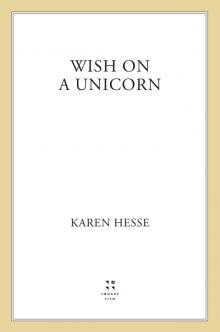 Wish on a Unicorn
Wish on a Unicorn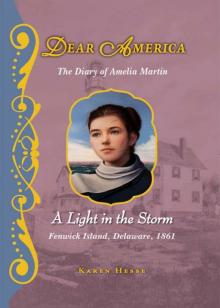 A Light in the Storm
A Light in the Storm